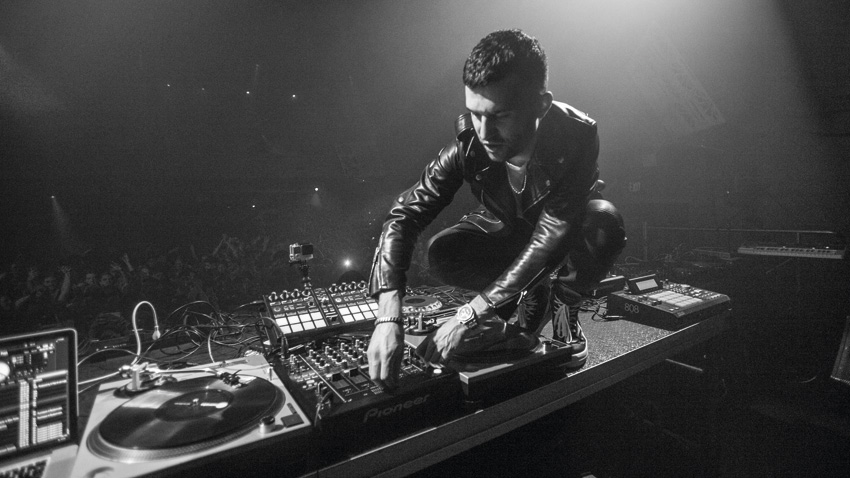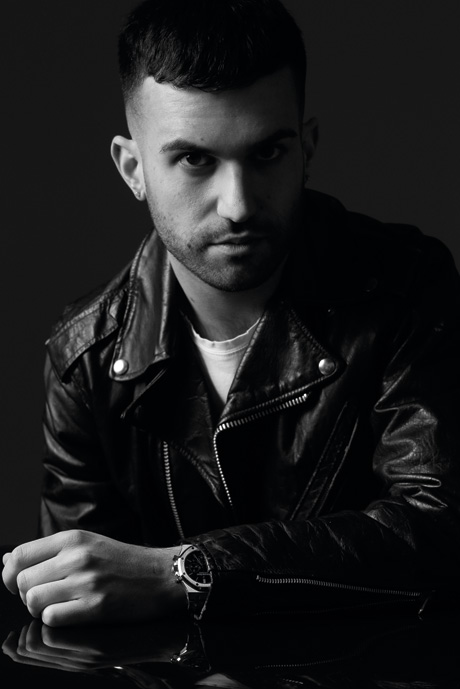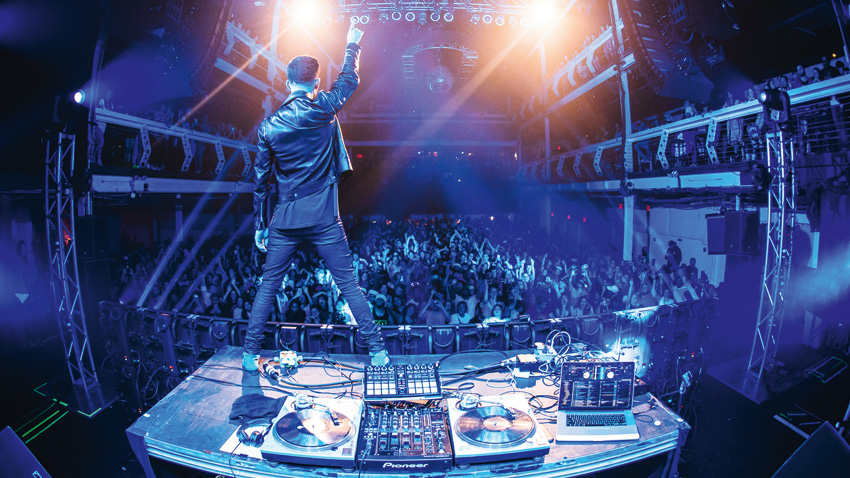A-Trak on making the transition from turntablist to producer and remixer
The former DMC Champion and Kanye West's DJ of choice reveals how remixing and Logic helped him find his own sound

Want all the hottest music and gear news, reviews, deals, features and more, direct to your inbox? Sign up here.
You are now subscribed
Your newsletter sign-up was successful
"Like a lot of young kids, I fell in love with music," explains Montreal-born DJ and producer Alain Macklovitch, better known as A-Trak. "But whereas most of my friends chose the guitar or the drums, I chose the turntable. Scratching was going to be my musical weapon."
By all accounts, he made the right choice. In 1997, aged just 15, Macklovitch became the youngest-ever Technics/DMC World Champion, feted by legendary turntable names who were literally old enough to be his father.
For a few years, Macklovitch doggedly stuck to the Technics, winning virtually every competition that he entered and scratching for emerging DJ software names like Serato. But with the encouragement of his brother, David - one-half of Canadian funksters Chromeo - he began drifting into the world of beats, remixes and then full-on production. His current CV is seriously impressive, boasting everyone from Dillon Francis and Dizzee Rascal to Armand Van Helden and Kanye West - the latter even invited A-Trak to be his tour DJ.
His latest single, We All Fall Down - released at the end of last year and featuring a soulful vocal from Jamie Lidell - surprised some with its bouncing, Calvin Harris-esque hooks, but Macklovitch makes no apologies for dabbling in different genres.
"When I first started out, I called myself a turntablist, and all I had to work with was vinyl and turntables," he recalls. "Eventually, I realised that if I wanted to push my sound, I had to change the way I worked. And y'know something? I'm OK with that. That's progress."
What was it about scratching that got you so excited?
"At the time, I was heavily into hip-hop, listening to artists like the Beastie Boys, DJ Shadow and Qbert. Scratching was the guitar solo of the world I was living in. Some kids get off on a screaming Les Paul and a Marshall stack, but I was transfixed by the crazy sound of the turntable. I would listen to something by Qbert and think, 'How the hell did he do that?' Some of the stuff he was doing didn't even sound humanly possible!
Want all the hottest music and gear news, reviews, deals, features and more, direct to your inbox? Sign up here.
"When I heard that it was just vinyl and a turntable, I rushed straight back to my parents' house and started 'scratching' on my dad's record player. I guess most hip-hop kids have a go at scratching at some point in their lives, but when they can't make it sound like DJ Hurricane, they just give up.
"God knows how, but the first time I tried it, I was… OK. It kinda sounded like I wanted it to sound. It sounded a little bit like it did on a record. So, for the next few months, I annoyed the hell out of my family and ruined most of my dad's record collection. Eventually, I got a second-hand 1200 and spent every spare moment practicing. Sure, I started winning a few competitions, but I didn't actually think I was that good."
You became DMC Champion at 15 and didn't think you were 'that good'?
"OK, winning the DMC was a step up, but I just thought there was going to be a kid like me in every city in every country, all over the world.
"It was around that time that I met Qbert and, of course, I was totally excited about meeting one of my heroes. He asked if he could film me for this thing he used to do called Turntable TV, and I was so confused because I couldn't work out why the hell this legend would want to film me. I was just a kid from Montreal."
Was it all about hardware back then? No computer, no MIDI, no software?
"Yeah, it was all Technics, Gemini and Vestax mixers, and a big bag of vinyl. But I was actually involved with the software side of things quite early. After the DMC win, I got flown out to the NAMM show every year by one of the companies that sponsored me, and I got to hear about programs like Serato and Final Scratch way before they hit the streets.
"My friend DJ Craze had been part of the Final Scratch development team and I also met the guys from Serato, back when it was just a demo plugin for Pro Tools. I had a mess around with it and their package seemed much more solid compared to Final Scratch. We stayed in touch and I became a beta tester for them, right up until the actual release of Scratch Live."
"Pro Tools allowed me to grab the best four or eight bars of a kick drum track instead of having to do the whole thing by hand."
Did the software side of DJing immediately make sense to you?
"[Laughs] Not at all. For anyone of my generation, it was all about hardware and vinyl. Software flipped everything on its head and, for a while, it was too much for me to take in.
"But the thing you've got to remember is that a bag of vinyl weighs a hell of a lot, and DJs began to realise, 'Hey, with Serato, we don't have to limit ourselves to the vinyl we can carry'. You ask any DJ and they will have a horror story about travelling with vinyl. You struggle through the airport, you check it in, you hope to God they don't lose it, you have a heart attack when your vinyl ends up in LA and you're in Amsterdam.
"This was also the start of the age of the mash-up, so every DJ was hungry for more music - music that could be transferred and traded while you were on the road. The combination of these factors, plus the technical aspects of Serato, meant that there was a subtle but definite shift within DJ culture… a shift towards software."
To the point where you started to investigate DAWs?
"Actually, I'd already got Pro Tools and I'd had a bit of experience with Cakewalk. If we rewind to just after I won the DMC Championship, my brother - way before Chromeo - was working as a hip-hop producer with local bands. His setup was the family PC, Cakewalk and an S950. Both of us were working in the basement of our parents' house, and we naturally began to swap knowledge and ideas. I would look over his shoulder and, almost by osmosis, I started to learn about producing.
"At the time, I was making a few beats of my own, but I was literally scratch-producing four minutes of music by hand. I'd grab a kick drum and scratch it for four minutes, a snare, hats, a couple of bass notes and an interesting lead line… all scratched from my record collection, layered and mixed on a Tascam multitrack. I loved the actual live feel of the beats I was making, but it was driving me crazy. Four minutes of kick drums, right on the beat, is not an easy task.
"Pro Tools had a great reputation for handling audio, so that's the platform I was looking at. Unfortunately, Pro Tools was way out of my price range back then - it was the kind of thing you only found in expensive professional studios. Then I heard about Pro Tools LE and, suddenly, it became affordable for people like me. Sure, $1500 was still a lot of money back then, but I was gigging and making decent money, so I jumped in.

"I was still scratching, still practicing my art, but Pro Tools allowed me to grab the best four or eight bars of a kick drum track instead of having to do the whole thing by hand. DJ Shadow was working in the same way, but he was on the MPC.
"Then there was the whole thing of portability. If I was making music with vinyl and decks, it meant I could only make music when I was at home, sitting in the basement. If my setup was in the laptop, I was free to make music pretty much anywhere."
But all the music you made was sample/scratch-based? No synths or drum machines?
"Although there were plugins available for Pro Tools and I did actually try a couple of them, they caused all sorts of CPU and freeze problems. At first I wasn't too bothered, but I was beginning to take a passing interest in other forms of electronic music, not just hip-hop. I wanted to experiment with different sounds and tempos. No one wants to make the exact same song for the rest of their life… that just doesn't make sense!
"By 2003, I was beginning to listen to some of the French stuff like Daft Punk, the Ed Banger label and Simian Mobile Disco from the UK. These guys were making club tracks, but they still seemed to have the grit and the feel of a hip-hop record.
"At first, I started investigating an early version of Reason, because that gave me immediate access to synths. With Reason, I could create my distorted basslines, but somebody showed me Ableton Live, and I found that it was easier to program in Ableton than it was in Reason. Not to mention the fact that you could record audio in Ableton.
"So, there I am, using Reason for synths, but ReWiring that to Ableton for programming and audio. When it came to mixing down, I knew Pro Tools better than both of the other programs, so I bounced the track over and mixed it there."
You were certainly getting your money's worth out of each program!
"Yeah, the whole thing was way too complicated, but the truth was that I didn't feel comfortable enough to put everything in the hands of just one program. And the results I was getting were… pretty good. As a producer, I was still learning my way around, and my technique wasn't too heavy-handed.
"If you look at the average club track today, you've got so many synth sounds and so much music fighting for space that you really have to work hard at getting a mix right. But I came from the hip-hop school of production, where things are a lot simpler. The beat sounds too dry? Let's add little reverb. There's not enough top end? Let's tweak the EQ.
"The guy who taught me to get a little more adventurous was XXXChange [aka Alex Epton, originally one half of Spank Rock]. He would craft all these bizarre sounds, recording street noise and sending it through a Roland Space Echo. He showed me that effects could be used to create their own sound - you don't just use a delay on vocals.
"And he was also using Logic, which seemed to answer all those questions I'd been asking myself in the studio. Here was a program that was powerful, it had great effects, great synths, you could record audio, and it didn't cause your computer to crash every two minutes. I switched over to Logic around version 7 and stayed with that until last year, when I finally moved to Ableton."
You were using Ableton Live way before you used Logic. How come you never made it your main DAW?
"At first, you've got to remember that Ableton was a live tool, and that's what I used it for - it was great for mash-ups. Obviously, as time went on, more and more people were using Ableton in the studio - I looked at some of the stuff Skrillex was doing and the workflow was so quick - but I was never completely happy with the sound of Ableton until version 9.
"I still have Logic and I'm still a fan, but there's something about the way you can throw things together in Ableton that makes everything so much quicker, fresher and more enjoyable."
"Man, I even came up with a type of musical notation that could be used to transcribe scratching!"
At the same time as you were making your name, your brother Dave was helping turn Chromeo into one of Canada's most successful electronic acts. Is it natural for two brothers to exchange ideas in the studio?
"A lot of my early productions were remixes, and Dave was great at listening to something and immediately spotting what was wrong: the kick's too loud, there's not enough bass, that bit's too long… he's got a great ear."
There was a point where you were knocking out seven or eight remixes a year.
"Some people do a remix and they do the same thing over and over. I'm not saying that's a bad thing, because some record companies will go to a certain artist for precisely that reason. My approach was different, though - every remix for me was a totally new song. I remember doing a remix for Robyn [2010's Indestructible], and wondering if I could turn the song's Abba-style disco strings into a dirty, LCD Soundsystem post-punk, post-disco thing.
"When I was asked to remix Kanye West's Stronger, I wanted to take the Daft Punk vocoder section and really glitch it up. I started to break the whole thing down and began pitching and playing with individual syllables. Some people might only get that deep into a production for one of their own songs, but I felt like I was finding my sound by working on other people's music. I learned how to produce my own music by remixing."

Which handily brings us to the recent release with Jamie Lidell, We All Fall Down. Are there always going to be A-Trak fans who want you to make dark, minimalist cut 'n' paste tunes like, say, Enter Ralph Wiggum?
"Probably, but that was nearly 20 years ago. Electronic music has moved on a lot since then, technology has moved on a lot since then, the whole scene in the US has shifted on its axis… and I've heard a lot of different music in those 20 years. Things change. What more can I say?"
How's your scratching these days?
"My hands were probably a bit nimbler when I was 15, but these days I see turntablism as just one tool that I can use, alongside Massive and Sylenth and Battery. In the beginning, it was the only tool because my entire life was immersed in that scene. Man, I even came up with a type of musical notation that could be used to transcribe scratching! But I don't regret a single moment of the time and the commitment that I gave to the turntable, because it's what got me where I am today."
A-Trak's We All Fall Down Remixes EP - featuring remixes by Stfu, Jaykode, Cory Enemy & Syre, Dombresky, Willy Joy and Esquire - is out now.


Computer Music magazine is the world’s best selling publication dedicated solely to making great music with your Mac or PC computer. Each issue it brings its lucky readers the best in cutting-edge tutorials, need-to-know, expert software reviews and even all the tools you actually need to make great music today, courtesy of our legendary CM Plugin Suite.
